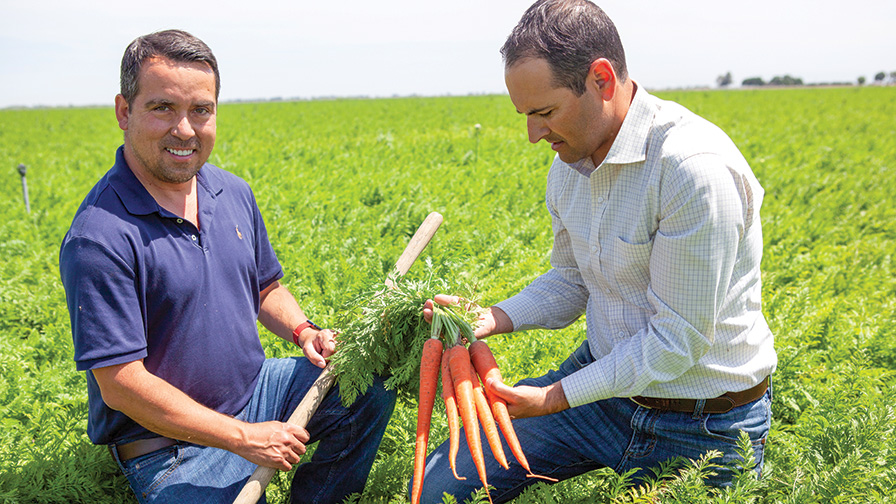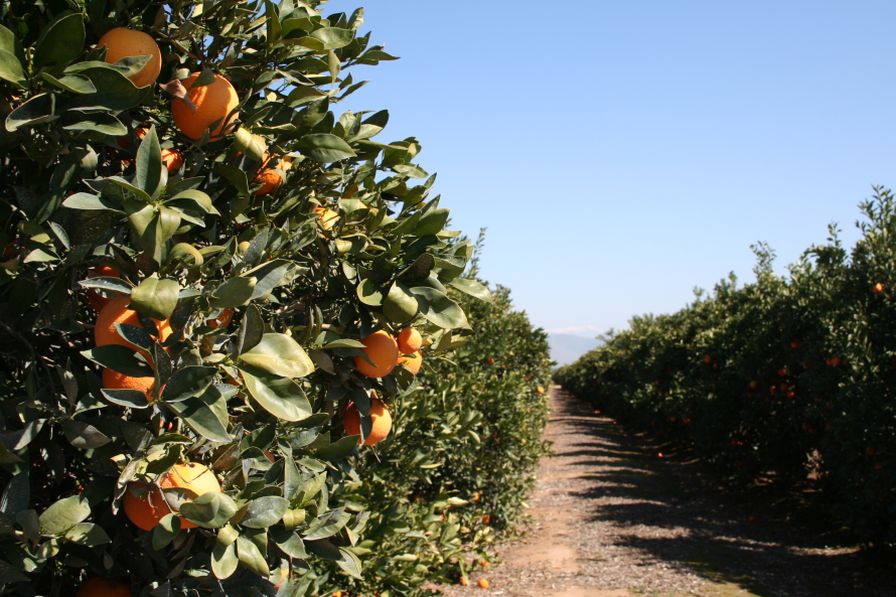Bowles Farming Company Finds Leaders from Within

Farm Manager Ben Garcia (left) and Vice President Derek Azevedo (right) say respect drives their operation — respect for the soil and respect for the people.
As other California growers engage in a turf war over hiring farmworkers, Bowles Farming Company has a steady workforce. What’s behind its success?
To them, it’s simple. Their respect for employees gives everyone from field workers to tractor drivers the opportunity to rise through the ranks of management. Bowles’ workers can see a future for themselves if they want to reach for it.
Cannon Michael, leader of the current generation to helm Los Banos, CA-based Bowles Farming Company, joined the family farm in 1998. At that time, it was a top-down operation, he says, where management candidates came from the outside.
“But these were people who didn’t know the farm or how we did things, so a lot of the outsiders were being taught our ways by those who were working for them. Now, we’re going straight to the people who already know how to be a part of our business,” he says.
Michael backs up his concept with action. Take the current farm manager, Ben Garcia.
Garcia started as an irrigation crew member on a nearby 4,000-acre dairy farm, and he rose through the ranks to farm manager. He left California briefly for other opportunities before returning to his home community and joining the much larger Bowles Farming Company. He soon became an irrigation supervisor, and then two years ago, Michael encouraged him to manage the 11,000-acre farm.
Bowles Must Offer a Different Type of Training
When outside supervisors joined Bowles in the past, they had to learn the details of the farm from the workers. But one thing they understood was leadership.
Now that Bowles promotes from among those workers, it needs to support the new leaders in non-traditional ways, says Bowles’ Vice President Derek Azevedo.
“Peer to a supervisor creates a different dynamic,” he says.
Something as small as asking a former peer to show up to work on time can cause friction.
So the Bowles leadership team ensures the new supervisors get training in accountability, feedback, and how to handle tricky situations.
“We want them to have the tools to handle things,” Garcia says.
It’s important to recognize the new leaders’ life experience to that point.
“A lot of folks who were traditional tractor drivers and irrigation workers weren’t exposed to these concepts,” Azevedo says.
He points out that if their parents didn’t use these skills because have the kind of jobs demanding them, their leadership training is even more important.
Another challenge can be language.
“Some of them don’t speak English, which isn’t a big deal for us because I speak both Spanish and English,” Garcia says.
Different consultants spend a few days each year with Bowles’ leaders, Garcia says. And leadership training is for mid-level supervisors on up to senior management.
Since Bowles’ daily operations already focus on meeting goals and crop-related issues, the training focuses primarily on leadership skills.
“This is how you manage conflict; this is how you give feedback,” Azevedo says, offering topic examples.
Each time there is a different focus, he says. One was a general introduction to management, and another was a drill down on how to communicate effectively.
“We’ve tailored it as we’ve gone along,” Azevedo says.
Promoting from Within Offers Hope to All Employees
Hope is a powerful motive in a workforce. Hope for a steady living is what sent immigrants to American farm fields throughout its history.
“Why not give those who love the company the chance to be leaders?” Garcia asks. “The supervisors we’ve moved up in the roles have been with the company 10 years or even 20 years. We want to show the younger folks that there will be opportunities.”
The underlying message to everybody else, Garcia says, is that if you work hard and model your behavior on those promoted, you too can rise up in the company.
“It gives them a daily inspiration of ‘I could be driving in one of those trucks around the farm; I could have my own area,’” Garcia says.
Bowles has a decent pool of workers to choose from — 60 people on the regular payroll. Seasonal workers can peak between 400 and 600.
Home-Grown Leaders Are a Home Run
The upper management team has been very happy with the results.
“But that’s not a surprise. That’s why we’ve invested in it,” Azevedo says.
One reason it’s so successful is that those promoted fully understand the operation’s culture. Their work ethic is well known. And since they’ve typically been with Bowles for more than a decade, if they had problems working with others on the team, it would have been noticed long ago.
“If someone else came in as a manager, there would be a lot of unknowns,” Azevedo says.
“The greatest reward is seeing the guys progress,” Garcia says. “They’ve come a long way from where I had to talk to them a lot, getting their confidence up, not making the same mistakes. Through my career, I’ve had good mentors. And I’d like to be a good mentor, too.”
Mentors are important, he says.
“I wouldn’t be where I’m at if I didn’t have people taking the time to give me their advice,” Garcia says.
The program has been a great success so far.
“This has turned out to be a win-win for both us and them because it’s unlocked the potential of some of the people we already had in place and given them additional motivation to move forward,” Michael says.
The employees were an untapped resource, but no longer.
“The folks know everybody [in management]. We know them — and sometimes their parents. It gives us a cultural continuity,” Azevedo says.
Garcia thinks the key to Bowles’ program is respect, not just for those promoted but for all workers.
“Not everyone is going to be supervisor, but everybody can be a leader,” he says.
Azevedo agrees and takes it one step further. He says Bowles’ philosophy centers on two words: respect and grow.
“If we respect our employees, our soil, our consumers, our suppliers, and we grow good crops, we’ll thrive,” he says.
Lee Allen contributed to this article.










